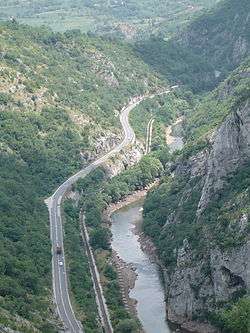Sićevo Gorge

The Sićevo Gorge (Serbian: Sićevačka klisura; Serbian Cyrillic: Сићевачка клисура, pronounced [sîtɕɛʋatʃkaː klǐsura]), a river gorge in Nišava District, Serbia, is the most prominent geological feature formed by the Nišava River. The gorge is located between Bela Palanka and Niška Banja; it is 17 km long, 350–400 m deep, in some parts developing canyon-like structures (including the inverse valley slopes at Gradiški kanjon; Cyrillic: Градишки кањон). The gorge is cut into the Kunovica plateau, between the southern slopes of the Svrljig mountains and the mountain of Suva Planina. The surrounding areas are known for their high-quality vineyards. The gorge contains a quarry, Ostrovica, and six villages: the largest, Sićevo, gives its name to the whole gorge.
Archaeological findings
In June 2008, a possible Homo erectus jaw was excavated from a cave in the gorge from Mala Balanica cave.[1] This hominin jaw was dated between 397 and 525 ka, by electron spin resonance combined with uranium series isotopic analysis, and infrared/post-infrared luminescence dating. The morphology of the mandible differs significantly from Homo heidelbergensis; and there is a complete lack of derived Neandertal features. The jaw represents one of an increasing number of specimens from the southeast of the continent demonstrating plesiomorphic erectus-like traits coupled with synapomorphic traits common to Middle Pleistocene hominins [2]
References
| Wikimedia Commons has media related to Sićevo Gorge. |
- ↑ A possible Homo erectus jaw from Sicevo Gorge, Serbia; Anthropology.net, June 29, 2008.
- ↑ Rink, William J.; Norbert Mercier; Dušan Mihailović; Mike W. Morley; Jeroen W. Thompson & Mirjana Roksandic (2013) "New Radiometric Ages for the BH-1 Hominin from Balanica (Serbia): Implications for Understanding the Role of the Balkans in Middle Pleistocene Human Evolution"; PLOS ONE.
Coordinates: 43°19′00″N 22°07′00″E / 43.3167°N 22.1167°E